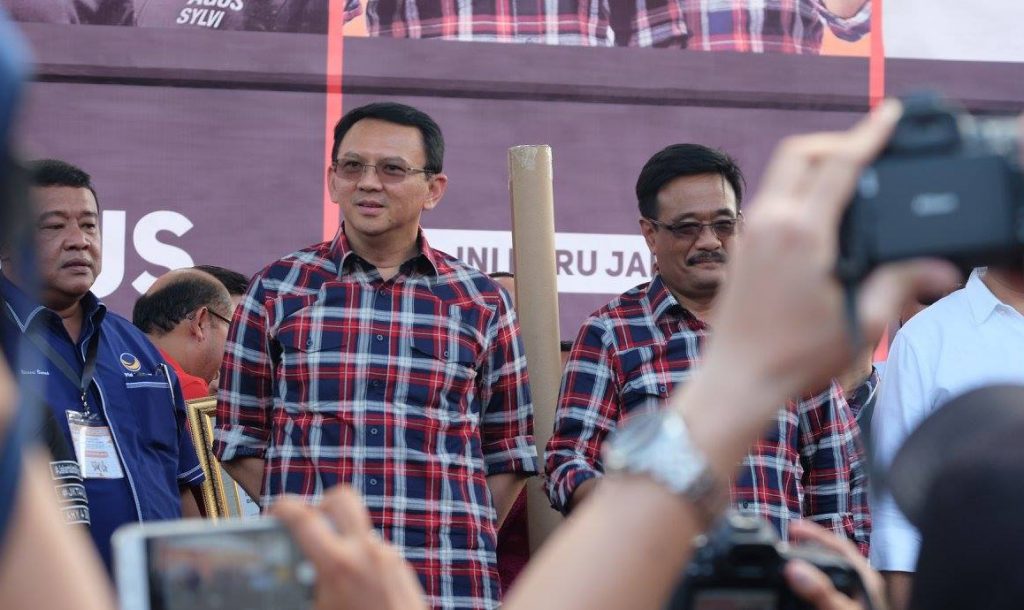Adhi Priamarizki asks what Ahok-Djarot must do in order to win the second round of the election.
The Indonesia Democratic Party of Struggle (PDIP) won in 57 areas (provinces, cities, and municipalities) during the country’s recent regional elections (Pilkada Serentak). This was from 101 ballots and represents approximately 56.4 per cent of the total vote.
These returns are a good result for PDIP, with the achievement a crucial morale booster for the party’s cadres, particularly at the regional level. Despite this decent achievement, however, the main attraction of 2017 Pilkada is the 2017 Jakarta Governor Elections that is headed to a second round on April 19.
PDIP’s candidate for governor, Mr Basuki Tjahaja Purnama (Ahok) and running mate Djarot Saiful Hidayat (Djarot) won some 43 per cent of the vote in the first round — managed to qualify despite a sustained and nasty campaign from opponents. It is the second round that will prove PDIP’s political mettle.
Ahok and Djarot’s ticket also has the backing of three other parties — Golkar, Hanura and Nasdem. But only PDIP has the strongest working political machine to propel Basuki and Djarot to victory. The second round of the vote provides a promising test-case for whether the party can secure a victory in incredibly challenging circumstances.
During the first-round, PDIP, and in particular the party’s regional offices, did not demonstrate a high-level of support for Basuki and Djarot. The party barely reacted in the face of several concerted rejections against the pair across Jakarta. Luckily, the pair survived these concerted attacks and managed to reverse its potential loss of votes. However, it would be difficult to claim that the PDIP machine contributed to this comeback in any meaningful way.
In the second round, Ahok-Djarot will face Anies Baswedan and Sandiaga Uno, who are supported by Gerindra and Prosperous and Justice Party (PKS), and recently Hari Tanoe’s Indonesian Unity Party (Perindo). It should be noted that PKS has a large voter base in Jakarta and regularly plays the Islamic card to attract Muslim voters. Moreover, the Anies-Sandi pair looks likely to gather people who voted for Agus Yudhoyono and Sylviana Murni in the first round, as well as clinch a coalition with the latter’s parties, National Mandate Party (PAN), National Awakening Party (PKB), United Development Party (PPP) and Democrat Party. It will be a tough contest.
In order to win the second-round, Ahok-Djarot need PDIP to work for and support them fully. Since the re-election of Sutiyoso in 2002, PDIP has been always on the winning side in elections for Jakarta’s governor. This is marvellous political capital for the party as it has a winning tradition in Jakarta. The party also won the 2014 Jakarta legislative elections by securing the largest vote (1.2 million votes) and parliament seats (28 seats). Clearly, PDIP has the power to overcome the militancy of PKS and Gerindra cadres in this election.
But to do so PDIP, particularly those cadres in Jakarta’s local offices, need to employ pragmatic approaches. First, PDIP must consolidate their stance and ensure Jakarta local offices support Ahok-Djarot firmly without any signs of reluctance. Second, the party could lobby the Democrat Party to join its coalition for the second round. On the national stage, PDIP and Democrat Party have often collided in fierce rivalry, primarily due to the conflict between the two parties’ leaders Megawati and Susilo Bambang Yudhoyono. However, the two parties repeatedly worked together in several regional elections, including in the 2007 Jakarta Governor election when the two parties supported the Fauzi Bowo and Prijanto ticket.
Moreover, based on a survey from Indonesia Indicator, Democrat Party has the strongest party identification amongst Agus-Sylvi supporters. Forging a coalition with Democrat Party may attract those supporters to vote for Ahok-Djarot, though religious reasons could hinder such decision. The second round of Jakarta Governor Election would be a neck and neck race between the two pairs rather than a straightforward contest.
Adhi Priamarizki is a PhD student at Ritsumeikan University, Kyoto. He tweets at @adhipriamarizki
 Facebook
Facebook  Twitter
Twitter  Soundcloud
Soundcloud  Youtube
Youtube  Rss
Rss 